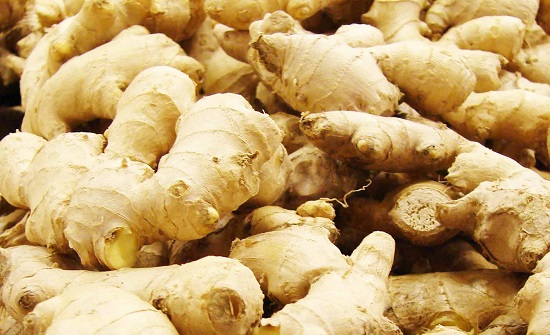This post has already been read 1984 times!
The Nigerian Export Promotion Commission in its Zero Oil Plan had identified ginger as one of the 12 strategic products with high financial value which it had identified to replace oil.
Other products with high financial value also identified by the NEPC are palm oil, cashew, cocoa, soya beans, rubber, rice, petrochemical, leather, cotton, and Shea butter. By all standards, ginger is one of the popular agricultural commodities around the world.
The commodity is so popular owing to its numbers uses. Some of them are herbal medicines, spices of bread in bakeries, and its uses in breweries to produce drinks among others. Going by official statistics, Nigeria is currently the third largest exporter of Ginger in the world after China and India.
Experts say the Nigerian ginger is highly regarded in the international market for its quality and highly medicinal value. Specifically, its aroma, purgency and high oil and Aleoresin content are other distinct features of ginger products from Nigeria.
In the Nigerian market, ginger is not only popular,it is in high demand. At a time when the government is implementing various measures to boost the agricultural sector, experts say this has provided entrepreneurs with a platform to key into the economic diversification policy of the government. For instance, Ahmed Inuwa, says he left a paid employment to go into the farming of ginger owing to its huge rate of return on investment.
He says for ginger business to thrive, timing is of importance. According to him, planting of ginger starts from March and harvest is ready in November.
Inuwa says that ginger can either be sold in the local and international market as wet ginger and dry split ginger, adding that dry split ginger is of high demand in export trade. He says in the last five years, ginger has grown to be one of the most important agro-commodities after cocoa.
For instance, he says in the international market, ginger went from $1,500 per ton in 2011 to about $5,000 per ton in 2016.
He says, “There are a lot of opportunities in the ginger value chain. From planting to processing, exporting, logistics, extracting and a whole lot of activities.
“Ginger is a hidden goldmine that most people haven’t consider except people that are from ginger producing areas.
“Planting of ginger is a serious work as ginger takes between eight to nine months to be ready for harvest, some people even leave the plant for 16 months. But you can outsource the planting by paying the people to plant for you.”
He says if the best agricultural practices are followed, the yields from ginger farm can be between 16 tons to 20 tons per hectare.
“If the best agronomy practice is followed ginger yields 16 tons to 20 tons per hectare. Locally, a ton of dried split ginger is as high as N850,000,” he adds.
Giving a cost estimate of how much will be required to cultivate a hectare of ginger farm, he adds that this will require about N800,000.
Giving a breakdown of this cost, he explains that depending on the location, leasing of land may cost N100,000, while rhizomes and land preparation is expected to cost N280,000, and N100,000, respectively. In terms of labour for planting, he estimates that this may go for N150,000,while fertilizer/manure/chemical is estimated to cost N100,000. During the period of harvest, he says one may require labourers at the farm which may cost about N80,000.
He says going by the assumption that if a ginger farmer loses 40 per cent to 50 per cent of the tons he harvested as a result of lack of processing and storage facilities, he will still have on the average eight tons to ten tons to sell.
He adds that when this is sold at an average of N500,000 per ton, such farmer would have made profit of between N3.2m to N4.2m which is over 300 per cent returns on investment.
To invest in ginger business, experts say it is important to have a business plan. The plan must cover issues such as soil analysis, price of the commodity and its potential market.
The Executive Director, Nigeria Export Promotion Council, Mr Segun Awolowo, says the government is targeting to grow the country’s non-oil export revenue through ginger and other products from $1.2bn in 2016 to $8bn this year.
This, he explains, will be achieved through the zero to export initiative which is one of the programmes of the NEPC that focuses on creating a new generation of Nigerian exporters through practical and theoretical training in export business.
He says, “The zero to export programme is aimed at achieving specific objectives which include development of new exporters from zero knowledge to a point of export readiness, equipping exporters using practical hand- holding approach, field training and mentorship to build a new crop of indigenous exporters.
“The council’s zero oil plan is the flagship programme aimed at mobilising public and private resources towards replacing oil as the number one source of foreign exchange “The programme equally has a vision of growing non-oil exports from $1.2bn in 2016 to $8bn in 2019 and eventually $25bn by 2025.”
[Punch]



